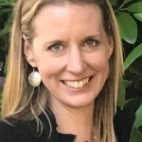Amy L. Eva, Ph.D., is the associate education director at the Greater Good Science Center. She writes for the Center’s online magazine, facilitates the Summer Institute for Educators, and creates online resources for educators. She is one of the key developers of the website, Greater Good in Education, which features science-based practices for creating kinder, happier schools. With 25 years in classrooms, she is a teacher at heart, fascinated by the psychology of learning and students’ social-emotional development.
During her twelve-year tenure as a teacher educator, she became particularly passionate about educator resilience and self-care, and she loves to conduct workshops that focus on teacher well-being. One of her recent publications “The Mindful Teacher: Translating Research into Daily Well-being,” describes mindfulness, provides research-based evidence of its usefulness, and highlights resources that educators can use to manage stress. Some of her consulting work has also included presenting on “Empathy: The Science and Art of Connection” at the Minneapolis Institute of Art, and assisting LG in their “Experience Happiness” initiative, featuring curriculum for middle and high school students focused on six happiness skills (mindfulness, human connection, gratitude, positive outlook, purpose, and generosity).
As a researcher, Amy has published in the areas of teacher education, metacognition, adolescent mental health, and mindfulness-based interventions with marginalized youth. She has also written numerous articles for Greater Good Magazine (as well as Edutopia, Mindful, and The Huffington Post). She received her Ph.D. in Educational Psychology (Human Development and Cognition) from the University of Washington where she worked with high school students in language arts classes, helping them to draw on their emotional responses to poetry to guide their understanding and enhance their appreciation of literature.

